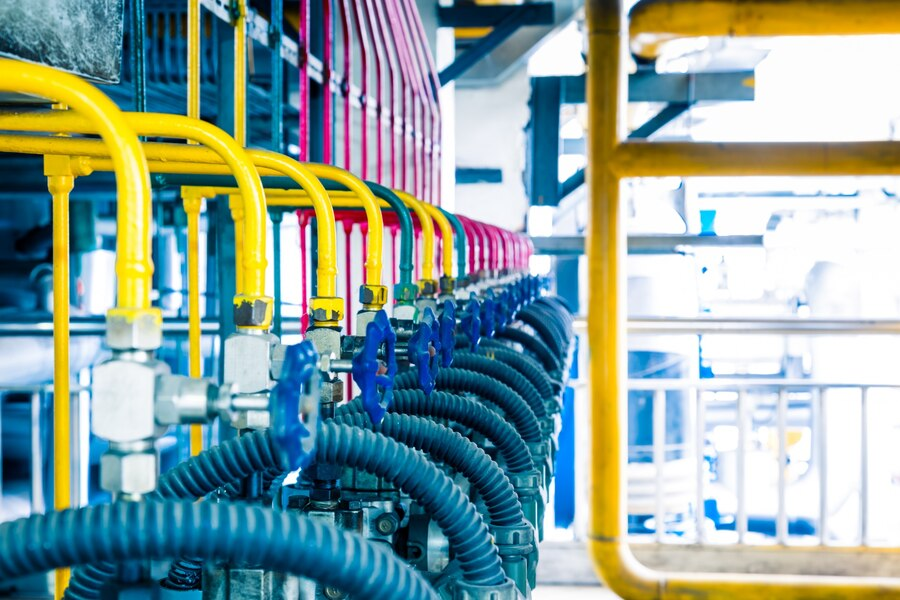As water scarcity intensifies and costs continue escalating, businesses must be acutely aware of how their water consumption impacts their overall efficiency and financial performance. Inefficient or outdated water systems can lead to skyrocketing utility bills, significant wastage, and a range of challenges that ultimately undermine profitability.
With water costs increasing significantly—averaging a 41% rise over the past decade—businesses must prioritize modern water systems utility upgrades to control expenses. These upgrades involve implementing advanced technologies and systems that optimize water usage, reduce wastage, and improve overall performance. Let’s discuss in detail how these utility upgrades can boost the efficiency of your commercial property!
Popular Water System Utilities Upgrades
Below, we have enlisted the most popular upgrade options:
-
- Backflow Preventers
Backflow preventers protect potable water from contamination by stopping water from flowing backward. They prevent the reverse flow of water caused by pressure changes in the water system, ensuring that clean water remains uncontaminated. By installing backflow preventers, businesses comply with local health regulations and safeguard public health. - Water Meters
With advanced metering technology, users can receive real-time data on their water usage, facilitating proactive management and conservation efforts. This upgrade helps control costs and encourages sustainable practices by raising awareness of water consumption levels. - Pump Stations
Booster pump stations are vital for maintaining consistent water pressure across a property, especially in high-demand situations. These stations enhance the overall efficiency of the water supply system, ensuring that water is readily available even in multi-story buildings and extensive commercial facilities. By providing adequate pressure, booster pumps help avoid issues like low flow rates and inadequate supply during peak times. - Isolation Valves
Isolation valves play a crucial role in water management by allowing system sections to be shut off for maintenance or emergencies without disrupting the entire system. Installing modern isolation valves improves the overall reliability of water systems, facilitates quicker repairs, and reduces the risk of water loss during maintenance activities. - Pressure Regulators
These are devices designed to maintain optimal water pressure within a plumbing system, ensuring consistent performance and protecting infrastructure. For example, pressure-reducing valves help control excess pressure and protect pipes, fixtures, and appliances from damage like leaks and bursts caused by pressure fluctuations.Similar to PRVs, pressure-regulating valves maintain optimal water pressure by automatically adjusting pressure based on demand. They prevent overpressurization, which can lead to leaks and equipment failure. - Post Indicator Valves
Post-indicator valves are essential components for managing water flow in fire protection systems. They allow quick access to shut off the water supply during emergencies or maintenance, enhancing safety and efficiency. These valves are visible and easy to operate, ensuring that water control is efficient and reliable. - Relief Valves
These valves are crucial for preventing excessive pressure build-up in water systems. By automatically releasing water when the pressure exceeds a safe level, they protect pipes, fixtures, and equipment from damage. Installing relief valves ensures system longevity, reduces maintenance costs, and enhances the safety of your commercial property’s water system.
- Backflow Preventers
Benefits of Water System Utility Upgrades for Commercial Properties
Now, you have a list of the top water systems utility upgrade options to consider. Before hiring a professional for the upgrades—have a look at the benefits you and your commercial property will get with these:
-
- Reduced Water Consumption
Upgrading to modern water systems can reduce overall water consumption by as much as 30%. Advanced technologies help monitor and optimize usage, leading to significant savings on utility bills. - Lower Utility Costs
As water rates continue to rise, implementing utility upgrades can mitigate monthly expenses. Businesses can effectively manage their water costs by reducing consumption and minimizing leaks, improving profitability. - Improved Water Quality
Modern filtration and treatment systems enhance water quality by removing contaminants, sediment, and harmful bacteria. This ensures compliance with health regulations and provides clean, safe water for employees and customers. - Environmental Sustainability
Upgraded systems contribute to environmental conservation by reducing water consumption and waste. As a result of reducing their carbon footprint, businesses can attract more customers towards their company who value sustainable practices. - Compliance with Regulations
As water conservation regulations become stricter, upgraded systems ensure compliance with local and federal standards. In this way, the risks of fines and legal implications associated with outdated systems are reduced. - Improved Water Pressure
Upgrading plumbing and fixtures can enhance water pressure, ensuring adequate supply for various applications. Improved pressure benefits everything from restroom facilities to industrial processes, increasing productivity. - Increased Safety
Modern water systems minimize the risk of contamination and waterborne illnesses, ensuring a safe environment for employees and customers. Upgraded systems comply with safety standards, protecting public health.
- Reduced Water Consumption
How to Choose the Right Professional for Water System Utility Upgrades
Selecting the right professional for your water systems utility upgrades is essential as it directly influences the success of your project. Consider the following points to ensure that you choose the right contractor for your project:
-
-
- Look for professionals who have successfully completed similar projects and can demonstrate a deep understanding of various water system technologies.
- A reputable contractor should provide a comprehensive proposal outlining the scope of work, timelines, and costs involved. This level of transparency helps you understand what to expect and aids in budget planning.
- Choose a contractor who communicates openly and effectively. A professional who keeps you informed throughout the process meets your needs and expectations.
-
Lastly, understanding building codes in commercial construction is essential for compliance and safety. Selecting an experienced expert ensures that your upgrades meet the necessary regulations and standards. Remember, an expert installation can open the door to numerous advantages, enhancing efficiency and sustainability. Conversely, selecting the wrong professional can result in costly errors and significant headaches, jeopardizing your investment and operational effectiveness.
Final Words
Upgrading your water system utilities is essential for achieving commercial property sustainability. So, if you are looking for reliable commercial utility contractors in Albuquerque, contact Dub-L-EE. Being in the industry since 2012, our expert utility crew handles every aspect with precision and dedication—from pump station to pressure regulator installation. In addition to installation, our commercial utility contractors manage other utility services related to water systems, including repairs, inspections, and removal.

Eddie has been a resident of Albuquerque his entire life.
After he graduated from high school, Eddie joined the Plumbers & Pipefitters Union where he obtained his Journeyman Plumber and Journeyman Gas Certifications. He then worked in the commercial plumbing industry for 7 years until he and his father decided to go into business together and started Dub-L-EE, LLC.
In the last 7 years Eddie has obtained his GA02, GA03, and MM98 certifications allowing Dub-L-EE to fully utilize Eddie Sr. and Eddie Jr.’s expertise in the construction industry.

